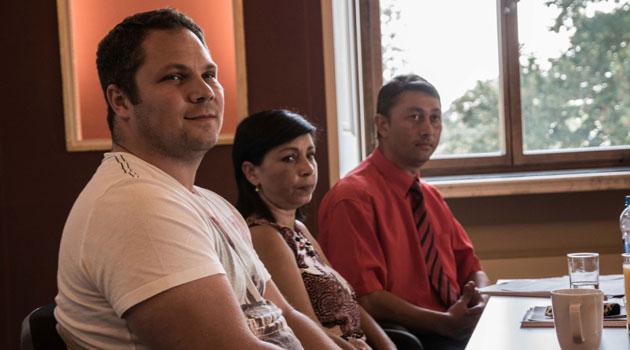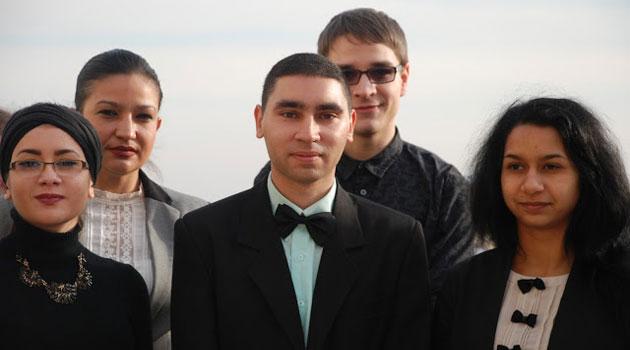Eva Danišová: Czech society has already crossed the line between intolerance and racism

On 16 September 2016, the Office of the Czech Government Council for Romani Minority Affairs and the Secretariat of the Czech Government Council on National Minorities held a training on the principles of community work and development of the skills necessary for negotiating with local governments. The training was attended by Romani representatives who negotiate with the local authorities in the places where they work and also in the socially excluded localities in which they move.
I was glad to be invited to the training because I am interested in the social situation of Romani people in other towns here. For many years I have been reading and translating into the Romani language, primarily for the the magazine Romano voďi, various conceptual documents about the integration of Romani people in the Czech Republic, from the Decade of Roma Inclusion, to the Coordinated Approach to Socially Excluded Localities, to the Support for Romani Integration, to the Support for Integration of Roma in the Schools, and many others.
For several decades I have been a field worker, both for nonprofit organizations and for the state administration, but despite that experience, I have never seen any practical results from the stacks of papers about Romani integration that I have just described. Even though many Concepts have been written (and still are being written) about this since the 1989 revolution, and even though there has also been a great deal of financial expenditure, the position of Romani people in the Czech Republic is not undergoing any marked change, and certainly not a positive one.
On the other hand, I would definitely not deny that some politicians have made an effort. Michael Kocáb was, in the role of Czech Human Rights Minister, ultimately criticized for being partial to Romani people, and many majority-society people may still have not forgiven him for that even today.
I think that as an educated, wise person he just saw a bit further ahead than those who are satisfied by just reading a few newspaper headlines. Today we have a new Minister for Human Rights, Equal Opportunities and Legislation, Mr Jiří Dienstbier, and I believe that he, too, is interested in integrating Romani people into society.
From the various debates and reports in the press, it is clear that the ministry under his leadership has an interest in solving problems and seeing them through to the end. The question remains whether it’s not too late already.
I shudder to see that Czech society has already crossed the line between intolerance and racism. Racist remarks by politicians at local and state level are being publicly tolerated, various local ordinances tailor-made to target Romani people have been adopted, and Romani people have complaints about the way the police work, such as in the case of the shots fired (from a starter pistol) and the racist insults shouted near the children at the camp organized by Ida Kelarová and the Miret group.
Nobody is bearing responsiblity today for citizens of Romani origin not being hired, not being housed, or not being served. Both in politics and in society, many things are going badly.
The Government understands that Romani integration is necessary, is allocating money for that, and is supporting work directly in socially excluded localities, but there are no results to show for it in everyday life. Across-the-board recommendations to advisory bodies to the Government and the ministries evidently do not work.
Change from below
Another attempt could be to try to change things “from below” at the level of municipal and regional authorities, directly where all of the problems with inclusion are currently happening. The principles of community work and of building communities should be a cornerstone for the beginning of a Romani integration policy.
It is important that Romani people who do not live in Prague or in other big cities know that somebody in authority and in power is listening to their opinions and dealing with them. Already from the names of the lecturers at this training, Tomáš Tožička and Saša Uhlová, it was apparent to me that it would be a professional, very well-prepared event.
The lecturers did their best to deliver as much practical instruction as they could to the Romani representatives about how to proceed with community work and negotiations with local governments. Theory only goes so far, though, and how this will take place in practice is difficult to estimate.
If a Romani community member decides to address the rest of the Romani community where he or she lives, even if that community member succeeds in motivating some partial change, that person still will not have any official mandate to negotiate with a local authority. Activity with that kind of weight could only happen under the auspices of the Czech Government Council for Romani Minority Affairs, which is an advisory body to the Government of the Czech Republic, as Martina Horváthová, coordinator of the training, confirmed to me.
No municipal authority is obligated to negotiate with Romani community representatives at all. Launching effective collaborations will require more years of analysis, seeking compromise, and building trust, both within the Romani community and within the local authorities.
There is also a risk that Romani activists will confuse community work with social counseling and social work, which are areas where success can be more visible. Another problem can be the apathy of Romani community members in the excluded localities.
Various nonprofit organizations have worked on and off in excluded localities for a long time – frequently the Diakonie organization works in such places, but its work does not bring about any practical impact for individuals in those communities. The vast majority of people in excluded localities remain dependent on welfare, have no chance of finding different housing, and have no chance of finding employment.
Frequently this leads to their having no faith in new approaches and to rejecting any changes a priori. Activation and empowerment of Romani activists is certainly necessary and can bring a new impulse to Romani communities, but we must count on the fact that this is something that will only bear fruit in the medium term.
If the local and regional authorities learn of Romani activists’ work and accept it (which cannot be assumed of all local assemblies), then such work could bring about small, positive changes. Naturally we cannot generalize – in some places common dialogue and work is already succeeding, but in others, not at all.
This is about the will to find a common language and give thought to what changes might be beneficial to all. Given the situation in which most of the Romani population of the Czech Republic find themselves, it is good to know that people from the majority society and Romani representatives, despite the increasing radicalization of the majority society, have not given up and are seeking other options for addressing integration.
